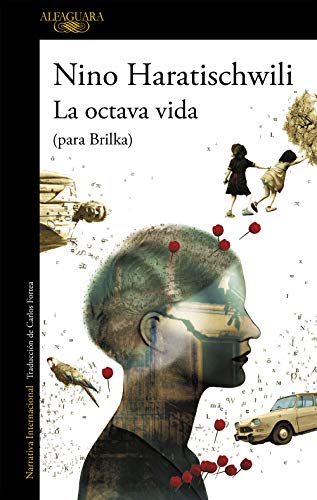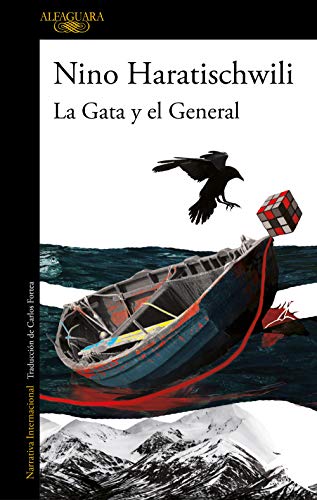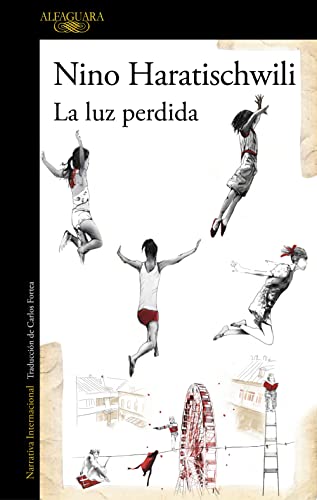There are best-selling authors who do not feel comfortable if they do not fill their voluminous books with several hundred pages. It seems that a long pagination endows commercial literature with greater prestige. Or at least that is the idea that resonates in the complex of the writer on duty ...
Another very different thing is the case of Nino Haratischwili. Because this naturalized German writer (although with deep Georgian roots) beautifully synthesizes in her books that, paradoxically, have at least 600 pages. And if during such an extensive plot you end up interpreting an immense work of synthesis, without a doubt it is because all that remains is life, essence, precise descriptions, a pure and hard plot without artifice from the spiritual and psychological depth of its characters. Of course, with some rhetorical recreation that a writer with such an extensive plot formulation can well afford.
It is all about enjoying yourself. And to learn and empathize. Novel is to offer that elixir for understanding that many of us already routinely have in the anteroom of dreams. A great book that accompanies you for several nights ends up being a traveling companion, a lover between your sheets. Nino knows how to give us those little pleasures with which to finish big every day.
Top 3 recommended novels by Nino Haratischwili
The eighth life
«Magical as One Hundred Years of Solitude, intense like The House of the Spirits, monumental like Ana Karenina»A novel that is capable of summarizing aspects of Gabriel García Márquez, Isabel Allende and Tolstoy, points to the universal of the letters. And the truth is that to achieve that excellence the novel already starts from more than a thousand pages. Of course, it cannot be easy to synthesize in a single novel so much inspirational reference of the first order. The question is to elucidate if the bombastic presentation finally corresponds to the work of this young German writer ...
Nothing better than doing a sincere exercise in introspection to try to tell a story with grounds. The author's own Georgian origins serve to locate a kind of remote temporal thread where everything can be justified, even a century later. Between the genetic load, the guilt and the transmission of pieces of soul from one generation to another we find the narrative sustenance. Because we are mostly made up of water in the organic and by the past in everything else. So when we find a novel that explains the reasons for being a person, we end up connecting with our own reasons.
And perhaps that is why this novel is compared with some others in the history of more universal literature in terms of the different manifestations of realism, from the most down to earth to the most magical enduringly associated with Gabo.
We traveled from Georgia in 1917, before it was eaten up by the Soviet Union. There we meet Stasia, a woman with broken dreams and loves broken by the revolution that would end in the Republic. And then we went to 2006 to meet Nice, a descendant of that dreamy Stasia faced with her destiny. The interim between the lives of Stasia and Nice is seen as a scene full of exciting intra-stories, mysteries and guilt.
There is always a trigger that ends up connecting the unfinished business of a family. Because it is essential to build personal history in order to move forward without burden. That trigger ends up being Nice's niece, a rebellious girl named Brilka who decides to escape her suffocating life to get lost in any other place in Europe that sounds like modernity, opportunities and a change of life.
Thanks to this search for Brilka that completely involves Nice, we enter into that vital recomposition in the shadow of the spirits of yesterday. A tragicomedy that certainly brings that blinding glow of the most classic Russian realism with the emotionality of other literary perspectives soaked in reality only bathed on the shores of other literary latitudes.
The cat and the general
The arrival of the writer Nino with an unpronounceable surname was that unusual popular cyclone for a genre with much historical fiction but loaded with enough sociological and geopolitical overtones to scare off bestselling readers. The eighth life it was an act of conciliation between the supposedly transcendent literature for quality and message and the bestsellers, as vilified as secretly longed for by any writer.
The balance to reach everyone could not be done except from the extension of the work. Nothing can be synthesized without leaving substantial parts in the pipeline so that some readers or others end up enjoying such a resounding plot.
And now Nino returns with another great novel that abounds in its magic formula about the parallel destinies of countries and families, of the great geopolitical movements and the small advances towards survival. The magical contrast of which Nino has made his particular scene full of guilt, melancholy, heartbreak, passions, secrets and all kinds of sensations you held as an unforgettable chorus of a great composition.
Chechnya, 1995: Nura dreams of fleeing her village, where clans rule the law and war threatens to crush all her dreams of freedom, which for her focus on her most prized possession, a Rubik's cube. Meanwhile, in Moscow, the young Russian Aleksandr Orlov abandons the love of his life to go to the front.
Twenty years later, this young idealist and reader has become an oligarch known in Berlin as the General, and memories of those years of war haunt him. He then sets out on a journey in search of the Cat, a mysterious young actress whom he saw for the last time with a Rubik's cube in her hand. Guilt, atonement, and redemption guide this journey as everyone tries to find their place.
the lost light
Without light there is nothing. That is why God said that Ego sum lux mundi. Everything depends on that first ray that breaks out in the east. And although it seems that it can never dawn again, clarity always ends up imposing itself. You just have to trust that the darkness will eventually dissipate one way or another.
The XNUMXth century is drawing to a close, and in Soviet Georgia the cries for self-determination are becoming louder. The fate of four radically different girls is linked by the courtyard that separates their houses in a Tbilisi neighborhood. Together, Dina, Nene, Ira and Keto, the narrator, navigate the end of childhood and the beginning of adult life, experience their first great love and face violence and precariousness that erupt with the independence of the country and the arrival of a turbulent democracy that will end up opening an inescapable gap between their families.
With echoes of Elena Ferrante, La luz perdida is an epic of friendship and betrayal in the context of a country that is beginning to take its first steps, a revolution that devastates the youth and a constant fight against a future of separation and pain.




Excellent writer. The panorama that he develops in his writing is monumental, always oriented, always precise when rounding off the characters and avoiding extreme situations. Brilka is quite a saga and in truth, the book seems short of so intense. Reading about Georgia, I am very interested in knowing its clear skies and its geography.
Thank you very much for your very timely comments, Efraín!